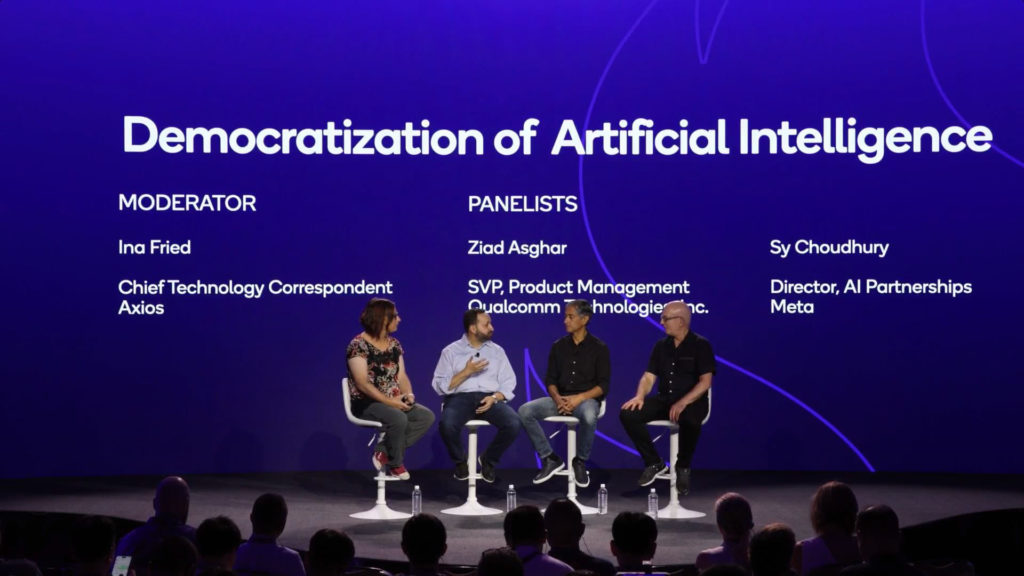This blog post was originally published at Qualcomm’s website. It is reprinted here with the permission of Qualcomm.
In a panel discussion at our annual Snapdragon Summit in the breathtaking setting of Maui, Hawaii, we had the privilege of engaging in a dynamic conversation with four esteemed experts about the democratization of artificial intelligence (AI).
Axios chief technology correspondent Ina Fried, Meta director of AI partnerships Sy Choudhury, Black Magic Design head of strategy for DaVinci Systems Dave Lebolt, and our very own Qualcomm Technologies senior vice president of product management Ziad Asghar, shared their insights on democratizing AI, its diverse use cases and the immense benefits it brings to the table.
The discussion gravitated toward the profound societal implications of AI and the imperative of responsible usage. Our panelists also emphasized the significance of open-source models and the boundless future possibilities that lie ahead in the realm of AI.
In today’s AI on the Edge series post, we present a recap of the memorable quotes and actionable takeaways from this thought-provoking discussion, providing the most valuable insights right at your fingertips.
Takeaway 1: Democratization of AI is key to societal benefits
The panelists concurred that democratizing AI technology can lead to remarkable societal benefits. They highlighted the importance of broadening access so benefits — such as improved healthcare and education — can be reaped globally, especially in developing regions. Asghar reinforced this sentiment, saying,
“I’m very interested in making sure that this technology is able to get into the hands of everybody.”
Choudhury also stressed this importance, noting the need for resources and capabilities to develop and train large AI models. “If you keep these technologies only in the hands of the few, then it’s not only a disservice to many other companies that don’t have the engineers or the hardware, but it’s actually a disservice to the world,” he elaborated.
Takeaway 2: AI can help creative professionals be creative
The panel provided clarity when it came to creativity and generative AI, sharing how it can help with mundane tasks so you can focus on the creative process. This could lead to more innovative and high-quality creative outputs. Lebolt added,
“People being able to make choices around how they can do their creative work without the drudgery and burden of doing pedestrian tasks is a lot of how I’m involved with AI.”
Choudhury added how this freedom from simple tasks is why AI has the potential to enhance creativity. It can take our mind off everyday decisions, so we can focus on more interesting, creative ventures.
Takeaway 3: Open-source AI can lead to more robust tech
The panelists discussed the importance of open-source AI models, which are available to a wide range of researchers. Companies can make improvements in the models themselves as well as build innovative applications on top of the technology.
Choudhury explained how open-source models can lead to improvements in technology. He stated,
“If you think about what democratization of technology means, it’s allowing the entire ecosystem of research, commercial companies and government institutions to be able to take something and improve upon it.”
Asghar agreed, highlighting that open-source models can lead to innovative applications that might not have been thought of by the original developers of the model.
He said, “I feel that it’s a win-win from both sides, right? I mean, we have seen that there is wisdom in crowds at the end of the day.”
He pointed out that open-source models can lead to a greater variety of applications, which in turn can benefit the entire ecosystem.
Takeaway 4: AI can have positive and negative societal impact
While the panelists were optimistic about the potential benefits of AI, they also acknowledged concerns about how AI could replace jobs and deepen societal inequalities because as it becomes more capable, it could displace workers, particularly among people performing rote or repetitive tasks.
Fried pointed out the potential positive and negative societal outcomes, stating,
“I can see a world in which widespread pervasive AI brings uniform benefits to all of humanity, but I can also really see it exacerbating existing inequalities.”
Lebolt acknowledged the concern about jobs, particularly among creative professionals, being replaced by AI.
He stated, “Things when you have more mid-range kind of gigs or lower ones, where it’s just more of the rote stuff. That’s not as protectable.”
However, he also noted that transitions in technology have happened before, and people have adapted.
Takeaway 5: AI can enhance how we interact with devices
The panelists look forward to how AI will change how we interact with devices. They envisioned a future where AI personal assistants, integrated within our devices, can help us manage our lives in more efficient and personalized ways.
Asghar proposed that AI could revolutionize human-machine interfaces, stating, “I feel that we will change the way we interact with our devices.”
Choudhury echoed this sentiment and highlighted the prospect of personal AI assistants that are always available to help, stating,
“The idea of having a personal assistant that’s always there with you, helping you, like helping you with your life, is about to be realized.”
Access the full interview
Industry professionals: Gain access to the 45-minute panel discussion, held at our Snapdragon Summit 2023 in Maui, Hawaii. This complimentary, on-demand content includes deeper insights and analysis of the above key takeaways, with details on why:
- AI technology has the potential to reshape industries and society, but its implementation needs to be equitable and beneficial for all.
- Models like Llama 2 can help in the responsible use of AI technology by allowing for shared knowledge and collaborative problem-solving.
- AI can significantly enhance personal productivity and alter the way we interact with our devices.
- AI needs to be used responsibly and ethically, with clear guidelines around what constitutes original content versus AI-generated content.
- There are concerns about AI exacerbating existing inequalities and contributing to misinformation, which need to be addressed.
Lara Piu
Editor in Chief, OnQ
Manager, Marketing
Qualcomm Technologies, Inc.







